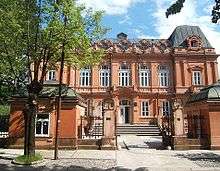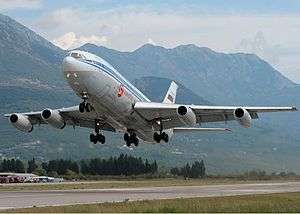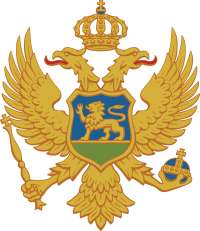Montenegro–Russia relations
 |
|
Montenegro |
Russia |
|---|---|
Montenegro–Russia relations (Russian: Российско-черногорские отношения) are foreign relations between Montenegro and Russia. Montenegro has an embassy in Moscow and Russia has an embassy in Podgorica.
History
Before recognition of Montenegro at the Congress of Berlin

In 1710, Metropolitan Danilo I Petrović-Njegoš, who led Montenegro into independence in 1697, went to Russia in order to gain recognition from the Czarist Empire. Moscow pledged aid[1] and declared the Russian Empire as a protector to Montenegrin independence.[2] During this time Russia was fighting against the Osmans in the Russo-Turkish War from 1710–1711.
Monarchy period (from 19th century until 1918)
Nicholas I of Montenegro, the last king of Montenegro, exchanged support with the Russian monarchy. In 1868 he undertook a journey to Russia, where he received an affectionate welcome from the tsar, Alexander II. Two of King Nicholas's daughters were married to Russian monarchs, Princess Milica and Princess Anastasija. Under Nicholas I, Montenegro was an ally of Russia in the Russo-Japanese war. Volunteers from Montenegro were fighting in the Russian Army.[3] In 1905 Japan recognized Montenegrin independence and declared an end to the war.[4] A peace treaty was signed.[5]
After 1918
During that period both states were part of the Soviet Union and the Socialist Federal Republic of Yugoslavia as communist nations although it ended with the Tito–Stalin Split in 1948.
Accession of Montenegro to NATO
A poll in July 2015 from the Centre for Democracy and Human Rights, which receives financial support from NATO, found that 36.6 percent support membership, to 37.3 percent against, with sharp divisions between ethnic groups: 71.2 percent of Montenegrin Albanians and 68 percent of Montenegrin Bosniaks support membership, while only 11.3 percent of Montenegrin Serbs do.[6] NATO Secretary General Jens Stoltenberg has said that low public support for NATO could affect whether Montenegro is able to join NATO in 2015.[7] Montenegro's accession would result in "retaliatory actions", said a spokesman for Russian President Vladimir Putin.[8] Djukanovic, Montenegro's evergreen ruler since 1991, dismissed the opposition's and Russia's objections to Montenegro's NATO membership. At a meeting with the representatives of non-government organizations, he described the invitation as "one more important step towards Montenegro's full membership in the European Union." Meanwhile, even the opinion polls conducted by the traditionally NATO-friendly foreign-financed NGOs reveal a much more complicated picture than what the NATO officials routinely describe as “Montenegrins’ desire to be in NATO which is not to be hampered by Russia.”[9]
Economy
Russia plays a big role in the Montenegrin economy. In 2012, Monstat reported that Russian businessmen have majority shares 32% of foreign enterprises present in Montenegro.[10]
Tourism

Montenegro and Russia share a visa-free regime on travelers between the two countries since 2008.[11] Montenegro is recognized as one of the most popular destinations among Russian tourists.[12][13] In the summer of 2011, Russians composed of over 20% of all the tourists that visited Montenegro.[14]
Controversies
Privatization
Up until the dissolution of Serbia and Montenegro, the majority of business enterprises in Montenegro were state-owned. Following independence, mass privatization swallowed up many of Montenegro's former-state companies. Privatization in Montenegro has been recognized among Russian officials as a matter of controversy since 2005, when Vladimir Vaniev (at the time representing the Russian Consulate in Podgorica) said sarcastically in a press conference regarding the privatization of Montenegrin aluminum-producer KAP that "he didn't know that Montenegro was the 51st state of the United States."[15] Vaniev also accused the Montenegrin press of being funded "in dollars" by the United States in order to support a disproportionate privatization wave for the benefit of American interests.[16]
Property ownership
The dissolution of the Serbo-Montenegrin union also led to large swaths of property being sold to eccentric profiles under controversial exchanges. Russian press claimed in 2012 that Russian citizens own at least 40% of real-estate property in all of Montenegro.[17] In September 2012, Croatian news portal Globus called Montenegro a "Russian colony", accusing Milo Đukanović of manipulative strategies in post-independence privatizations for the benefits of non-Montenegrins.[18]
See also
References
- ↑ http://www.montenet.org/history/danilo.htm
- ↑ M.A. Stefan Dietrich: Die montenegrinisch-russischen Beziehungen 1878-1918, Vienna 2001. Introduction to the book.
- ↑ http://www.armchairgeneral.com/forums/showthread.php?t=76870 and http://www.rp-net.ru/store/element.php?IBLOCK_ID=30&SECTION_ID=0&ELEMENT_ID=3515#%F0%E5%F6%E5%ED%E7%E8%E8
- ↑ http://hnn.us/roundup/entries/26860.html
- ↑ http://www.mentalfloss.com/blogs/archives/21221
- ↑ "CEDEM poll: Montenegrins split over issue of NATO membership". Policy Association for an Open Society. 31 July 2015. Retrieved 2 December 2015.
- ↑ "NATO Seeks Higher Montenegro Public Support for Membership". The New York Times. Associated Press. 11 June 2015. Retrieved 21 July 2015.
- ↑ http://www.bbc.com/news/world-europe-34981973
- ↑ https://www.rt.com/op-edge/324912-montenegro-nato-provocation-russia/
- ↑ Blic - Vesti - Ekonomija - Rusi vlasnici trećine stranih firmi u Crnoj Gori (Serbian) Retrieved July 2, 2012.
- ↑ Russia, Montenegro visa-free travel regime comes into effect Retrieved November 21, 2008.
- ↑ Tourism-Review: Ten Most Popular Foreign Countries Among Russian Tourists Retrieved August 23, 2010.
- ↑ Invest Montenegro - Montenegro most attractive for Russian tourists Retrieved August 24, 2010.
- ↑ Balkans.com - Serbia and Russian tourists lead Montenegro's tourism in August Retrieved September 30, 2011.
- ↑ The Economist: A Slav's best friend Retrieved April 28, 2005.
- ↑ Pravda (English): Russian consul calls Montenegro USA's 51st state Retrieved April 6, 2005.
- ↑ Novi magazin - Rusi vlasnici 40 odsto nekretnina u Crnoj Gori (Serbian) Retrieved January 10, 2012.
- ↑ Globus - Ruska kolonija Crna Gora (Croatian: Russian colony Montenegro) Retrieved September 29, 2012.

